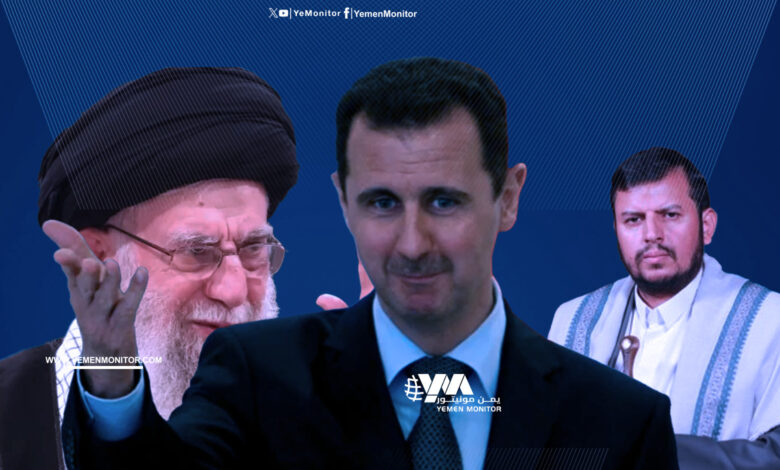
Yemen Monitor/Special Writings:
A week ago, no one would have imagined that Iran would allow Al-Assad regime to collapse. Before that, neither Bashar al-Assad nor the Iranians had grasped the extent of the deterioration within the last functioning institution in Syria: the military!
However, officials in Tehran were aware of the limits of their intervention in support of a president who had not decided to help himself for the past 14 years. Al-Assad regime was not only suffering from a collapsing economy, extreme poverty, and a starving army, but it was also politically inept, and the head of the regime was disgustingly arrogant and completely delusional with megalomania and delusions of grandeur and victory. He refused to respond to the demands of his people or to solutions that were put before him from Syria, the region, and the world.
Al-Assad complained to Abbas Araqchi that “his army is not responding.” It was his administration that caused severe losses within his forces: “decision-making, infrastructure, morale, units, and leadership,” which deprived him of the incentive to fight.
Iran did not expect Al-Assad to collapse so quickly. Assad’s failure and his recent stances were behind the weak state of sadness among Iranian officials. “Iranians can be happy,” said Heshmat Alah Flaht pisheh, a former member of parliament, adding, “No one has the right to spend the nation’s dollars to maintain a spider’s web any longer.”
Without Syria, we can see the entire resistance axis collapsing. With it, Iran loses the gains of four decades of patient work to assemble proxy movements across the Middle East, of which Syria was the crown jewel. But now nothing can withstand the rapid developments. Araqchi was disappointed to hear Baghdad refuse to send Shiite militias to save Al-Assad. But when he left, the Syrian rebels were approaching Homs, and it was then that he confirmed that supporting Al-Assad was impossible, so he ordered the departure of diplomats and the closure of the embassy; he spoke on Iranian television, saying, “The resistance front has had a really tough year.”
The Iranian regime has lost billions of dollars to keep Al-Assad afloat, and its most capable fighters from Al-Quds Force, the Revolutionary Guard, Hezbollah, and other Shiite militias have been killed defending him. Billions of dollars’ worth of economic projects in Syria have been destroyed since 2015 due to systematic Israeli airstrikes! But it was a losing cause from the beginning, and it became clear last year when Tehran needed him to achieve what it wanted within its “axis,” he hesitated, refused, and distanced himself, preferring the Gulf offer to help with reconstruction. He refused to support Hezbollah and launch operations within the resistance axis, and even the supposed supply line was being targeted on his territory. He imprisoned Hezbollah commanders who tried to mobilize for fighting in Lebanon from Syria!
In fact, the Iranian regime has lost “Qassem Soleimani” and “Hassan Nasrallah,” who carried the burden of the resistance axis on their shoulders, and without them and Syria, the axis will not be as it was before, and there will be no good relationship with Hezbollah. This will cause an earthquake domestically: questioning the extent to which the principle of “stopping the enemy outside the borders” can protect the country or bring war to it. And declaring the failure of Al-Quds Force and its commander, Ismail Qaani, as in just 4 years, Qaani destroyed what Soleimani had built over two decades, putting an end to the resistance axis as we knew it.
It is clear that Iran is very weak and its regional deterrence is greatly diminished. It has lost Syria, perhaps for decades to come; Hezbollah is retreating for years to survive in the future of Lebanon; Iraq seems that Tehran is struggling to pass any orders that serve it; as for Yemen, it has always given it much less importance than the Houthis believe, and has always relied on Hezbollah and Syria for help in Sana’a unless it decides to consider the armed group as an ideal alternative!
And as it is, the only remaining option is to turn into a nuclear power to deter its fears of being subjected to a war that is hovering over its skies more than ever before. The last chance is the diplomatic track, and the Trump administration does not seem to be making the task easy for Iran and the countries of the region.





